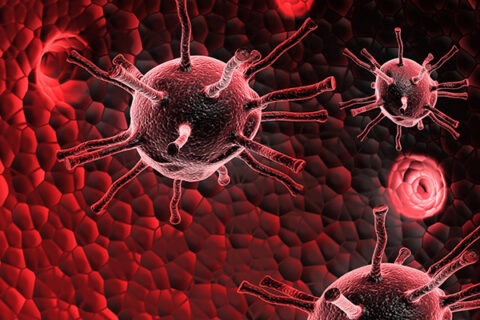FAU researchers decode important mechanism that can lead to renal cancer
Genetic variation is a determining factor
Around 15,000 people in Germany develop renal cell carcinoma every year. In its advanced stages, this form of cancer is very difficult to treat and has a high mortality rate. FAU researchers have now decoded a mechanism that plays an important role in the initial and further development of the disease.
Human DNA contains sequences that vary from person to person which are known as genetic variations. In a large study Dr. Johannes Schödel and Dr. Steffen Grampp from the Chair of Internal Medicine IV at FAU characterised a variation that increases the risk of developing renal cell carcinoma by up to 30 percent. This genetic variation lies on chromosome 8 near the important oncogene MYC.
Oncogenes are parts of DNA that can promote tumour growth. What is remarkable about the researchers‘ discovery is that the variation lies in a non-coding region between two genes – i.e. between the areas of human DNA that carry the protein-coding genetic information. These regions have not yet been examined in much detail as the main focus of research has been on protein-coding regions. How genetic variations affect the risk of developing renal cell cancer was not well understood until now.
Certain factors promote tumour growth
The results of the current study show that the variations lie at a point on chromosome 8q24.21 that transcription factors can bind to. Transcription factors are protein complexes that regulate the expression of particular genes. In most renal tumours there are mutations that lead to a stabilisation of hypoxia-inducible factors (HIF). These are actually responsible for adapting the cells and the body to a lack of oxygen, but in renal carcinoma they are also involved in tumour growth and are characteristic of the disease. The variations that the researchers observed lead to differences in the strength of HIF binding in non-coding regions of 8q24.21 that contain the variations.
These differences affect the strength of the stimulation of MYC expression. MYC is known to promote growth in many forms of tumours and influence the metabolism of affected signalling pathways. Further investigations showed that it is characteristic for the genetic variations to also affect DNA accessibility and activity in non-coding regions in renal cancer cells. ‚In addition to what we discovered about how HIF regulates MYC, we also found it astonishing that this binding site is only active in cells that originate from the kidney’s tubules, and that HIF-dependent MYC regulation is therefore dependent on cell type,‘ says Dr. Johannes Schödel, lead author of the study. Tubules are tube-like structures in the kidney tissue which are important for urine production and are where most renal carcinomas originate.
The findings therefore show how much genetic variations influence renal cell carcinoma and provide an initial functional explanation for this phenomenon. The study conducted by the FAU researchers and their partners at the University of Oxford led by Professor Sir Peter Ratcliffe was published in the latest volume of the journal Nature Communications: DOI: 10.1038/NCOMMS13183
Further information:
Dr. Johannes Schödel
Phone: +49 9131 8539560
johannes.schoedel@uk-erlangen.de
